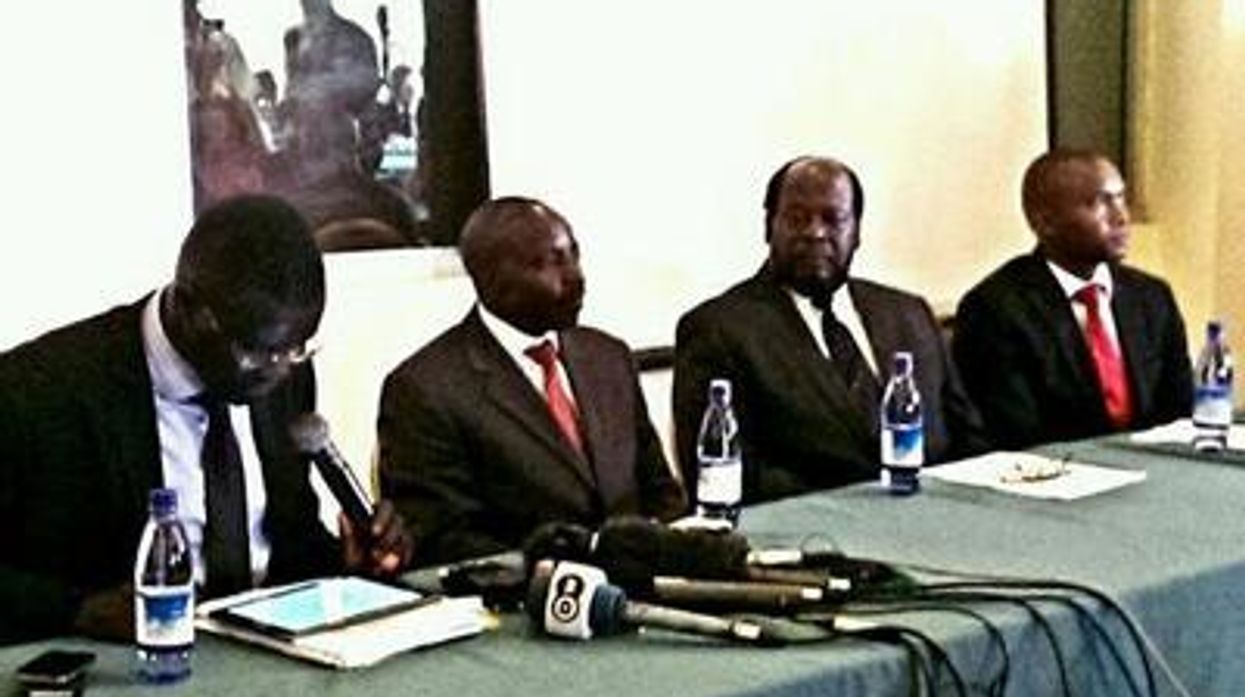Ugandan human rights organizations, LGBT activists, attorneys, and even some lawmakers filed suit in Uganda's constitutional court Tuesday, challenging the country's enactment of its draconian Anti-Homosexuality Act, which prescribes lifetime imprisonment for many instances of homosexuality, and lengthy jail terms for anyone found to be "aiding or abetting homosexuality."
The activists, scholars, and political commentators who filed the constitutional challenge in Kampala were joined by at least one member of Parliament, according to Uganda's NTV News. In addition to several prominent LGBT activists, petitioners also include Makerere University professor Olonka Onyango, former opposition leader turned professor Orenga Latigo, Budama West member of Parliament Fox Odoi, and political commentator Andrew Mwenda. Uganda's Civil Society Coalition on Human Rights and Constitutional Law is one of the primary organizational sponsors of the lawsuit.
The suit contends that Uganda's Anti-Homosexuality Act, passed by Parliament December 20 and signed into law by President Yoweri Museveni last month, violates the Ugandan constitution's promises of the right to privacy, freedom from discrimination, and freedom of assembly, expression, and association.
While Monday's constitutional challenge works its way through the courts, many of the same petitioners have filed a request for a permanent injunction with Uganda's High Court to stop media outlets from publishing the names and photos of those suspected to be LGBT -- a practice that was declared unlawful by the same court in 2010, but which has seen a fierce, deadly revival since the draconian law's passage.
Frank Mugisha, a prominent Ugandan LGBT activist and executive director of Sexual Minorities Uganda, tweeted Tuesday that he was "happy to be among the petitioners [on the] #rightside of history." Pepe Julian Onziema, another well-known LGBT activist and transgender man living in Uganda, changed his Twitter handle to list him as "AHA Petitioner No. 7," proudly announcing "Today I am #PetitionerNo7 and #IAmGoingNowhere."
"This Act not only represents an effort by the Executive and Parliament to scapegoat an unpopular minority for political gain but we believe it also violates the highest law of our country," Andrew Mwenda, a journalist who is one of the petitioners, told Reuters.
Even a former vice president of Uganda condemned the bill's passage, reports Uganda's Independent. Speciosa Kazibwe, the former vice president who now serves as the United Nations secretary-general's special envoy for HIV/AIDS in Africa, issued a statement Monday, noting that the law "only serves to fuel stigma and discrimination against the LGBT community and undermines the significant progress of the national AIDS response."
Since President Museveni signed the bill into law last month, LGBT Ugandans have been killed, attacked, driven into hiding, fired from their jobs, and evicted from their homes, with officials citing the law's prohibition on providing housing or support to LGBT people as the reasons their actions are justified.
In response, several European nations -- including Denmark, Sweden, and Holland -- have announced a cumulative $26 million in aid cuts, most of which were diverted from Uganda's government to nonprofits and nongovernmental organizations fighting for human rights in the East African Nation. Last month the World Bank announced the "indefinite delay" of a $90 million health care loan slated to be approved in February, citing concerns over the Anti-Homosexuality Act's impact on crucial medical support services like treating HIV and AIDS. U.S. President Barack Obama and Secretary of State John Kerry have both condemned the law, calling it "atrocious" and "disappointing," and announcing that the U.S. would launch an "internal review" of the country's close relationship with Uganda. At press time, the U.S. has not announced any cuts to the more than $450 million in aid annually given to the Ugandan government.
While LGBT Ugandan activists caution against unilateral aid cuts, noting that such actions could put the already embattled LGBT population at greater risk and limit access to important health care and advocacy networks, they do support targeted cuts to Uganda's government, suggesting that allies redirect those funds to nonprofits and NGOs working for human rights in the East African nation. The latest recommendations from LGBT activists in Uganda about how international allies can support their ongoing fight for equality include encouraging notable religious figures, celebrities, politicians, and corporate leaders to speak out against the law and the numerous other human rights violations in Uganda, organizing worldwide demonstrations, and lobbying governments to revise their policies for emergency asylum for those Ugandans who want to flee.





































































Charlie Kirk DID say stoning gay people was the 'perfect law' — and these other heinous quotes